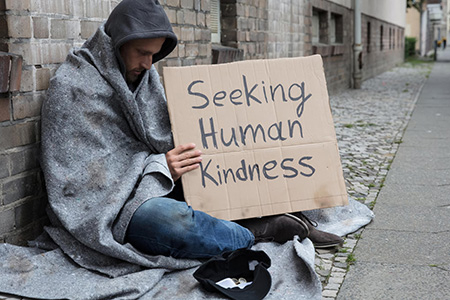Jesus said to his disciples: ‘I say this to you who are listening: Love your enemies, do good to those who hate you, bless those who curse you, pray for those who treat you badly. To the man who slaps you on one cheek, present the other cheek too; to the man who takes your cloak from you, do not refuse your tunic. Give to everyone who asks you, and do not ask for your property back from the man who robs you. Treat others as you would like them to treat you. If you love those who love you, what thanks can you expect? Even sinners love those who love them. And if you do good to those who do good to you, what thanks can you expect? For even sinners do that much. And if you lend to those from whom you hope to receive, what thanks can you expect? Even sinners lend to sinners to get back the same amount.
Instead, love your enemies and do good, and lend without any hope of return. You will have a great reward, and you will be sons of the Most High, for he himself is kind to the ungrateful and the wicked.
‘Be compassionate as your Father is compassionate. Do not judge, and you will not be judged your-selves; do not condemn, and you will not be condemned yourselves; grant pardon, and you will be pardoned. Give, and there will be gifts for you: a full measure, pressed down, shaken together, and running over, will be poured into your lap; because the amount you measure out is the amount you will be given back.’ (Luke 6:27-38)
Last Sunday we began to read Luke’s Sermon on the Plain. Luke has used Matthew’s Sermon on the Mount but changed and shortened it significantly. Today and next Sunday we will read the rest of the Sermon.
This week, Jesus’ radical teaching focusses on lavish generosity in human relationships. The opening words, ‘Love your enemies,’ set the tone of the rest of the text.
Again, at first glance the words of Jesus seem absurd and almost impossible to follow. Should we really offer the other cheek to someone who strikes us? Are we really meant to give the rest of our clothes to someone who steals our coat? Are we really meant not to fight to get our property back from the one who steals from us? Is this what Jesus really is asking us to do?
The point of this kind of prophetic speech by Jesus is to stimulate his audience (and us) to reflect on the whole pattern of behaviour in human relationships. Jesus is not really suggesting rules to be followed literally in certain circumstances. Rather, we are being invited to reflect on how we can respond to unreasonable demands and personal injuries with nothing but generosity and abandoning all claims to retribution and restitution.
What Jesus is suggesting are responses to insults and injuries which break cycles of violent retaliation and provide pathways to peace and reconciliation. By doing this, Jesus says, we can allow the utter generosity of God to shine through us. Doing good only to those who do good to us is not enough to convey the generosity and welcome of God. Only acting with overwhelming generosity and compassion allows the mercy, generosity and compassion with which God meets each of us to be clearly seen in concrete actions.
The Golden Rule: Treat others as you would like them to treat you.
When we act according to the generosity, mercy and compassion of God, refraining from judgement and condemnation and granting pardon, we meet God’s overwhelming abundance of generosity to ourselves.
Read our prayers and reflections for this Sunday here.
Celebrating At Home 7th Sunday in Ordinary Time [PDF]
Celebrating At Home 7th Sunday in Ordinary Time [ePub]















